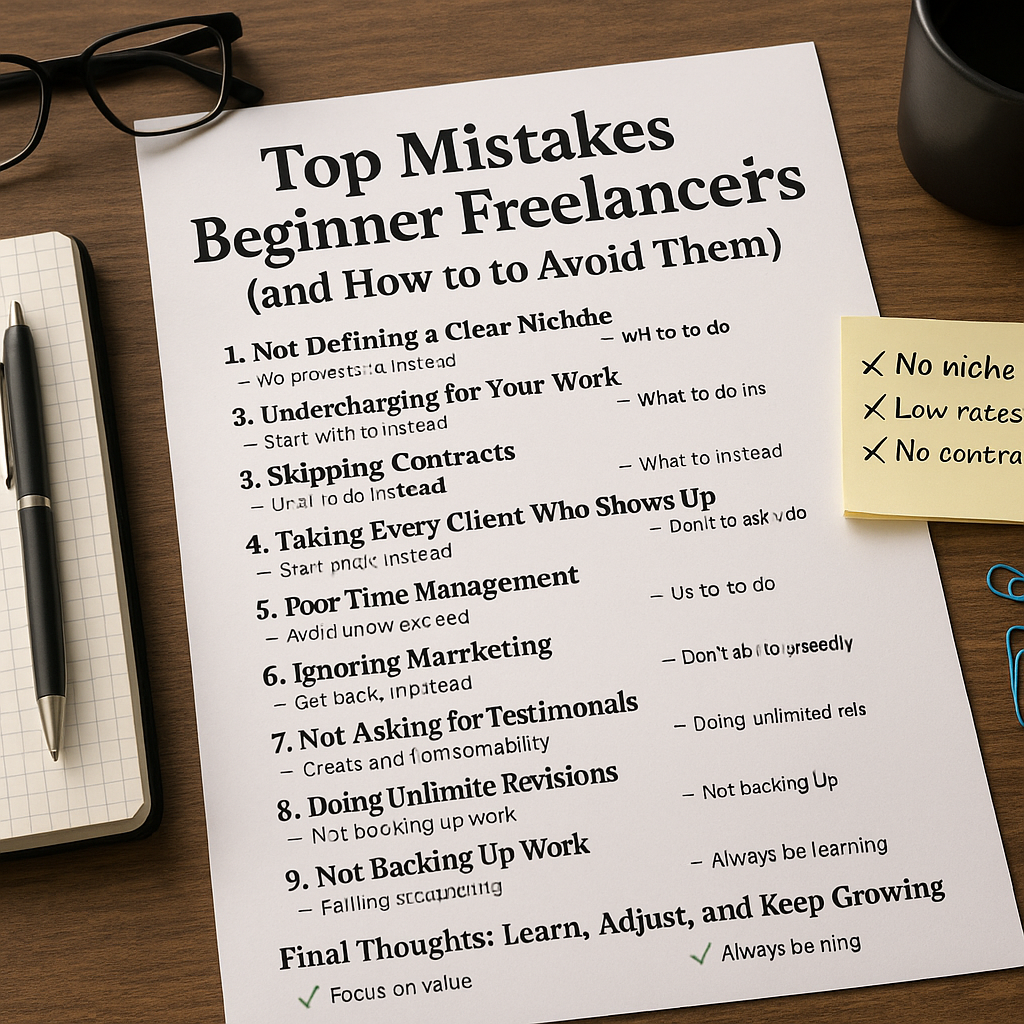Starting out as a freelancer is exciting—but also full of unknowns. While enthusiasm is important, many new freelancers fall into common traps that can hurt their progress, income, and reputation. The good news? These mistakes are easy to avoid once you know what to look for. In this article, we’ll explore the most common freelance mistakes beginners make—and how to steer clear of them from day one.
1. Not Defining a Clear Niche
A common beginner mistake is offering “everything to everyone.” This makes it hard for potential clients to understand what you do and how you can help them.
Why it hurts:
- Your marketing lacks focus
- You attract low-paying or misaligned clients
- You get overwhelmed doing too many different things
What to do instead:
- Pick a specific service (e.g., SEO writing, logo design, web development)
- Focus on a target industry or client type (e.g., coaches, SaaS, nonprofits)
- Develop expertise and authority in that space
2. Undercharging for Your Work
Many freelancers start with rates that are too low, hoping to win clients fast. But underpricing sends the wrong message: it suggests your work isn’t valuable.
Why it hurts:
- Attracts low-quality clients
- Makes it hard to raise prices later
- Leads to burnout from working too much for too little
What to do instead:
- Research industry rates
- Factor in expenses, time, and taxes
- Start with fair entry-level pricing, then raise as you grow
3. Skipping Contracts
Working without a contract—especially with new clients—is risky. Verbal agreements are easy to misunderstand or ignore.
Why it hurts:
- No protection against non-payment
- Disputes over scope and deadlines
- Difficult to enforce boundaries
What to do instead:
- Use a simple contract template (many are available online)
- Include scope, timeline, deliverables, payment terms, and revision policy
- Get it signed before starting any work
4. Taking Every Client Who Shows Up
New freelancers are eager for work—but saying yes to every offer can backfire.
Why it hurts:
- You end up with difficult or underpaying clients
- It distracts you from your ideal niche
- It leads to stress and poor-quality work
What to do instead:
- Define what makes a good client for you
- Ask screening questions before accepting projects
- Learn to politely say no when it’s not a good fit
5. Poor Time Management
Freelancing means managing your own schedule—and many beginners struggle with this freedom.
Why it hurts:
- Missed deadlines
- Overbooked schedules
- Burnout and inconsistent income
What to do instead:
- Use tools like Google Calendar, Trello, or Notion
- Set realistic project timelines
- Block time for deep work, admin tasks, and breaks
6. Ignoring Marketing
Many freelancers think clients will just “find them”—but marketing is part of the job.
Why it hurts:
- Leads to dry spells with no projects
- Makes income inconsistent
- Slows down growth
What to do instead:
- Post regularly on LinkedIn or Instagram
- Join freelance job boards and groups
- Reach out directly with personalized pitches
- Build a simple website or portfolio
7. Not Asking for Testimonials
Positive feedback builds trust—but many new freelancers forget to ask for it.
Why it hurts:
- Missed opportunity for social proof
- Makes it harder to win new clients
- Leaves your portfolio looking incomplete
What to do instead:
- Ask for testimonials after each project
- Make it easy with a quick form or template
- Display them clearly on your website or social profiles
8. Doing Unlimited Revisions
Offering unlimited edits might seem generous, but it often results in scope creep and wasted hours.
Why it hurts:
- Clients take advantage
- Projects drag on longer than planned
- You work more for the same pay
What to do instead:
- Include a set number of revisions (e.g., two rounds)
- Clearly define what a “revision” includes
- Charge extra for additional edits beyond scope
9. Not Backing Up Work
Beginners often forget that tech can fail. Losing client files or drafts can cost you hours—or your reputation.
Why it hurts:
- Lost work = lost time
- Damaged trust with clients
- Stress and missed deadlines
What to do instead:
- Use tools like Google Drive, Dropbox, or external SSDs
- Set up auto-save and version history where possible
- Back up regularly, especially before final delivery
10. Failing to Set Boundaries
New freelancers sometimes let clients message at all hours, request calls on weekends, or demand instant replies.
Why it hurts:
- Blurs the line between work and life
- Increases stress and resentment
- Makes clients expect 24/7 availability
What to do instead:
- Set clear work hours
- Communicate availability in your contract and emails
- Use autoresponders or scheduling tools to manage communication
Final Thoughts: Learn, Adjust, and Keep Growing
Every freelancer makes mistakes—it’s part of the journey. The difference between struggling freelancers and thriving ones is the ability to learn, adapt, and improve.
By avoiding these common traps and building smart habits early on, you’ll save time, energy, and money—and build a freelance career that’s sustainable and profitable.
Remember:
✅ Focus on value
✅ Protect your time
✅ Always be learning

